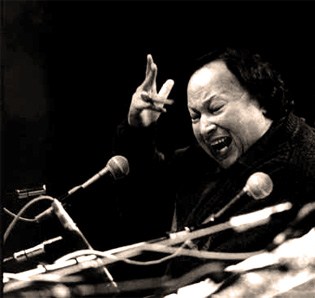
Nusrat Fateh Ali Khan
Ustad Nusrat Fateh Ali Khan PP (Punjabi: نصرت فتح علی خان, Punjabi pronunciation: [nʊsˈɾət̪ ˈfət̪e(ɦ) əliː ˈxɑːn]; born Pervez Fateh Ali Khan; 13 October 1948 – 16 August 1997) was a Pakistani singer, songwriter, and music director. He was primarily a singer of qawwali, a form of Sufi devotional music.[1] Often called the "Shahenshah-e-Qawwali" (the King of Kings of Qawwali),[2][3] he is considered by The New York Times to be the greatest Qawwali singer of his generation.[4] He was described as the fourth greatest singer of all time by LA Weekly in 2016.[5] He was known for his vocal abilities and could perform at a high level of intensity for several hours.[6][7][8][9] Khan is widely credited with introducing Qawwali music to international audiences. He was also a master of Hindustani classical music.[10]
Nusrat Fateh Ali Khan
16 August 1997 (aged 48)
Jhang Road Graveyard, Faisalabad, Punjab, Pakistan
Shahenshah-e-Qawwali
King of Kings of Qawwali
- Singer
- songwriter
- musician
- music director
1
- Fateh Ali Khan (father)
- Rahat Fateh Ali Khan (nephew)
- Rizwan-Muazzam (a group containing two of his nephews)
1964 – 1997
Born in Lyallpur (Faisalabad), Khan had his first public performance at the age of 15 at his father's chelum. He became the head of the family qawwali party in 1971 and brought his unique style of sargam, khayal, and rhythm to his family's legacy.[11] He was signed by Oriental Star Agencies, Birmingham, England, in the early 1980s. Khan went on to release movie scores and albums in Europe, India, Japan, Pakistan, and the U.S. He engaged in collaborations and experiments with Western artists, becoming a well-known world music artist. He toured extensively, performing in over 40 countries.[12] In addition to popularising qawwali music, he also had a profound impact on contemporary South Asian popular music, including Pakistani pop, Indian pop, and Bollywood music.[12][13][14]
Shaukat Khanum Hospital fundraising event[edit]
Khan was the main performer at Imran Khan's charity appeal concert at the InterContinental London Park Lane Hotel on December 3, 1992[30] to raise funds for Shaukat Khanum Memorial Cancer Hospital and Research Centre, a cancer hospital built in Imran's mothers name which provides free services.[31]
Other celebrities were also in the audience including Peter Gabriel, Elizabeth Hurley, Mick Jagger, and Amitabh Bachchan.[32]
Death[edit]
Khan was overweight in his later years; various reports stated that he weighed over 137 kilograms (300 pounds). He had been seriously ill for several months, according to a spokesperson at his U.S. label, American Recordings.[33] After travelling to London from his native Pakistan for treatment for liver and kidney problems, he was rushed from the airport to the Cromwell Hospital in London, where he died of a sudden cardiac arrest on 16 August 1997, aged 48.[34] His body was repatriated to Faisalabad, and his funeral was a public affair. His wife, Naheed Nusrat, moved to Canada after the death of her husband, where she died on 13 September 2013 in Mississauga, Ontario.[35][36] Khan's musical legacy is now carried forward by his nephews, Rahat Fateh Ali Khan and Rizwan-Muazzam.
Awards and titles[edit]
Khan is widely considered to be the most important qawwal in history.[37][38] In 1987, he received the President of Pakistan's Award for Pride of Performance for his contribution to Pakistani music.[25][39] In 1995, he received the UNESCO Music Prize.[40][41] In 1996 he was awarded Grand Prix des Amériques at Montreal World Film Festival for exceptional contribution to the art of cinema.[42] In the same year, Khan received the Arts and Culture Prize of the Fukuoka Asian Culture Prizes.[43] In Japan, he was also remembered as the Budai or "Singing Buddha."[44]
In 1997, he was nominated for two Grammy Awards, for Best Traditional Folk Album and Best World Music Album.[28] In 1998, he was awarded PTV Life Time Achievement Award.[45] As of 2001, he held the Guinness World Record for the "Most Qawwali Recordings", having recorded over 125 qawwali albums before his death.[46] In 2005, Khan posthumously received the "Legends" award at the UK Asian Music Awards.[47] Time magazine's issue of 6 November 2006, "60 Years of Asian Heroes", lists him as one of the top 12 artists and thinkers in the last 60 years.[48] He also appeared on NPR's 50 great voices list in 2010.[49] In August 2010 he was included in CNN's list of the twenty most iconic musicians from the past fifty years.[50] In 2008, Khan was listed in 14th position in UGO's list of the best singers of all time.[51]
Many honorary titles were bestowed upon Khan during his 25-year music career. He was given the title of Ustad (the master) after performing classical music at a function in Lahore on the anniversary of his father's death.[52]
Khan was listed at position 91 on Rolling Stone's 200 Best Singers Of All Time list, which was published on January 1, 2023.[53]
He was called the ‘Singing Buddha’ in Tokyo, ‘The Voice of Paradise’ in Los Angeles, ‘Quintessence of the Human Voice’ in Tunis, ‘The Spirit of Islam’ in London, ‘Pavarotti of the East’ in Paris, ‘Emperor of Qawwali’ (Shahenshah - e - Qawwali) in Lahore.[54]